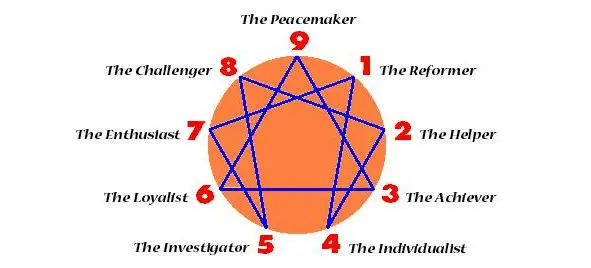– The effect of “wings’…
– What are sub-types?
– All the different combinations of types and sub-types added together to form your unique personality
In order to live an effective life, understanding your fixations, ego, holy ideas, temptations and other factors your type tends to lean
– 8 —
towards – it is important to know them deep down, otherwise you will not be able to live true to yourself.
The Different Consciousness Levels
First of all, please take the test from either one of these 3 sources:
http://www.eclecticenergies.com/enneagram/test.php
http://www.enneagraminstitute.com/begin.asp
http://similarminds.com/test.html
After taking all some (or all) of these tests, you’ll discover how you can easily identify 2 things:
– You will know which of the 9 “types’ you are. You will be named among one of these types:
– The Reformer
– The Helper
– The Achiever
– The Individualist
– The Investigator
– The Loyalist
– 9 —
– The Enthusiast
– The Challenger
– The Peacemaker
– Note that among these 9 types, there is always a possibility that you could be leaning “left’ or “right’ towards one of the other accompanying types. In other words, you could be a pure achiever, an achiever with a helper “wing’, or an achiever with an individualistic “wing’.
– Each type is also mildly affected by other types they are connected with (See the diagram again for a better idea)

For example, a helper will feel stressed when a challenger is around but at ease when “helping’ an individualist. Likewise Loyalists are stressed around achievers but comfortable with peacemakers. This adds further environmental dynamics to all the types involved.
– 10-
– There’s also one more component called a subtype. It is also called an instinctual energy by some. What this means is, along with their type, a natural sub-type exist for all people and this instinctual level manifests itself it 3 forms:
– Self-preservation
– Sexual
– Social
Self-preservation sub-types are people who may internally place emphasis and externally express the need to protect themselves. The sexual sub-types (not sexual bodily…) are more to intimacy and forming close bonds with their partners and the social sub-types are typically those who function at their best when in large groups.
At the end of the day, with the 9 types and 3 sub-types, you will typically end up with at least 27 combinations (not including the various wings and stress points).
Remember that when you take the test, you must remain calm, collected and not under stress. Do not ponder on the answers for too long – if you take too long, you are over analytical and your answers will be marred by your biasness. Do not answer socially acceptable or idealistic answers either – do understand that one type is not superior
– 11-
or inferior to the other… the key point is to understand who you are and be yourself – a better you but not a different you.
Let’s go into detail about each type and how to deal with each of them!

– 12-
Chapter 2:
The Reformer and The Helper

Synopsis
The “Martin Luther’ of today, reformers are typically people who seek to change things and build upon the imperfections to make things more perfect.
This chapter talks about:
– What a reformer is all about
– Why are reformers good to have around
– What is most difficult about reformers
– Dealing with them and bringing out the best
– Who they get along with
– Who they don’t along with
Championing the cause of change, whether for the better or worse is part and parcel of a reformer – learn to love them, accept them for who they are and bring the best out of them!
– 13-
You can always count on them to lend a helping hand. These people live to serve and they enjoy doing it in the process!
This chapter talks about:
– What a helper is all about
– Why are helper good to have around
– What is most difficult about helpers
– Dealing with them and bringing out the best
– Who they get along with
– Who they don’t along with
Living in service and contribution to others is the core structure of a helper – learn to accept them, understand them for who they are and bring the best out of them!

– 14-
The reformers are the perfectionists of self, home and society. Their constant desire is to improve things, make things better because things always never seem good enough to them. Their attention to detail is impeccable – often finding fault and fixing even the smallest things.
Highly principled and never compromising, they live by the book and follow all the rules – they even expect others to do so as well. They also tend to be ambitious and to a point, like a workaholic.
These people are truly serious people whose pursuit for perfection is often a blessing and a vice to people around them.
The reformer’s holy idea of perfection is omnipresent. Their greatest desire is to create goodness, maintain impeccable integrity in their dealings and to balance the chaos around them.
They are always the first to take the right action, standing up for what they believe in and acting upon it when others are meandering and compromising or lacking in courage, you can always count on a reformer to step up first and do what needs to be done.
– 15-
They are also the best people when it comes to fixing things. You don’t have to do many things around the house because their delight is in fixing things, moving furniture, adding value and creating something different or better.
Living with these people is like a personal hell. You don’t need to die to experience hell – all you need to do is to marry one or live in the same house with them as they constantly expect you to abide by the (or their) rules.
They also have an ultra strong tendency to lean towards hypocrisy because no one is perfect even if they set the standards. Hypercriticism makes being around them unbearable at times because they will always find fault with others and fix them.
Their most commonly displayed emotion is one of anger because nothing around them seems good enough to them – constantly resenting imperfection in things, circumstances or others.
How To Deal With Them
Because of their holy idea of perfection, their basic fear and tendency is to fall into sin/evil and become corrupt due to their own natural greed.
– 16-
– self-preserving reformer must never be questioned about their personal reformative motives as they tend to keep to themselves about their grand plans for transforming the world. They do things quietly so the best way to deal with them is to acknowledge their efforts in little ways (they seldom show contentment or satisfaction)
Читать дальше
















